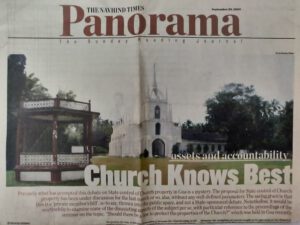State Control of Church Property: Unwarranted, Perilous and Counter-Productive

The proposal for State control of Church property has been under discussion, for the last month or so, alas, without any well-defined parameters. The saving grace is that this is a ‘private member’s bill’, so to say, thrown into the public space, and not a State-sponsored debate. Nonetheless, it would be worthwhile to examine some of the disquieting aspects of the subject per se, with particular reference to the proceedings of the seminar on the topic “Should there be a law to protect the properties of the Church?” which was held at the Goa International Centre on 28th July 2009.
Why now? – Precisely what has prompted this debate on State control of Church property in Goa is a mystery. At the said seminar, broad remarks and vague allegations were made about the functioning of the Church; there were some sweeping generalizations, too, mainly because the speakers failed to distinguish between the situation of the Church in Goa and the rest of India. As a result, none of them were able to convincingly state what is wrong with the status quo. If at all the present law regulating relations between the Church in Goa and the State is violative of the law of the land, as it was made out to be, how has the law been in operation for almost five decades? The fact of the matter is that the impugned law is not violative, because Ordinance No. 2 of 1962, promulgated by the President of India, provided for the continuance of that law and many others.
The theme of the seminar was artfully worded. It gave one the impression that the Church had solicited help and so the State was going to privilege her with a law protecting her properties from whosoever. While this was only too good to be true, it was also unnecessary, because the Church today is not seeking privileges any more than she rightfully has; what she eagerly desires, however, is conditions conducive to working peacefully within a secular framework.
Is ‘Secularism’ pliable? – Secularism would ideally mean total separation of Religion and the State, leaving no room for the latter’s intervention in the affairs of religious bodies. In a free society the State has to refrain from interfering with matters of a religious nature; its duty is to ensure that individuals can freely profess, practise and propagate their religion. In India, these rights can theoretically be abridged on grounds of public order, morality or health; the State can even make a law regulating or restricting any economic, financial, political or other secular activity associated with religious practice. But all this has to stand the test of “reasonable restrictions”, and it is incumbent upon the State to prove the need for change, lest the idea of secularism should turn pliable to the State’s whims and fancies.
Perils of State Intervention – One may tend to believe that State intervention is ‘safe’, considering that the rights of the minorities and the freedom of religion stand guaranteed by the Indian Constitution. One may not even feel threatened by some initial State involvement strictly limited to the secular part of a religious matter (say, the scale of expenses to be incurred by a religious institution in connection with rites and observances). In practice, however, such intervention can be an irritant or worse, an intrusion in the religious affairs of a body. Hence it must be ensured that the State intervenes only in extremis.
At any rate, is the Church in Goa a fit case for State intervention? And whatever the modalities of control sought to be exercised on the Church in Goa, citizens would, in the first place, doubt the State’s credentials for such a task! This is not to question the sovereignty of the State but only to emphasize that the State has almost always been a poor manager. For instance, by its intervention, a centuries-old, home-grown and much loved institution like the Ganvkari or Comunidades is in a shambles today. Such is the track record of the State that one can foresee that its control on Church property could result in gross mismanagement, appropriation of funds, encroachments, sale and alienation of lands, and the dismantling of the Church infrastructure, leading to a gradual demolition of the religion.
Political and administrative interference from the State is something that Boards and Trusts of some religious communities outside Goa have often complained about. Some faith communities were compelled by the civil law to have State-managed bodies appointed to run their affairs, because of certain circumstances related to the pre- and post-Independence history of their respective faiths. For them, State intervention became a necessary evil, whereas in Goa history took a different course. Therefore the argument that all religions, everywhere in India, must be on the same footing – or, in other words, suffer from the same malaise – is simply not tenable!
State within a State? – It was pointed out with gusto at the seminar that there cannot be a State within a State. Fair enough. But why cast a slur on the Church in Goa? Has the Church thrown a challenge or posed a threat to the secular State?
The ‘State within the State’ syndrome is perhaps true of some of our business houses. How else does one explain the lingering case of the decrepit River Princess? The concerned business house rules the waves, suggesting that they never will be slaves (with due apologies to ‘Rule Britannia!’). Indeed, they are a State within the State!
Or is it simply the magnitude of the Church’s holdings that makes her look like a State within a State? If yes, let this yardstick apply to our mineral ore exporters; they have to be held accountable for creating environmental problems – and what is more – while making profits on what is essentially State property! Will there ever be the political will to intervene in the internal affairs of these erring business houses?
In contrast, Church assets, mainly comprising donations and gifts from members of the community, have several onuses to be fulfilled. They are held by specific Trusts and their proceeds employed for charitable purposes, particularly education and health among the poorest sections and across faith communities.
Finally, is it the influence that the Church wields in public life that makes her look like a State within a State? Then the same objection should logically extend to the whole of the Fourth Estate!
And at this rate, we shall soon cease to be a democratic State!
Has the Church been above the law? – The world over, the internal affairs of the Catholic Church are governed by the Canon Law. Thanks to her international juridical personality, the said law is admissible in the court of law, since it is not at variance with the civil law. Hence the question “Can you allow any religious head to exercise his power without any regulation?” is malicious, and offensive to the head of the Church in Goa. While observing that “any activity ungoverned by law is lawlessness and would lead to arbitrariness” the speaker failed to recognize that India suffers miserably from lawlessness and arbitrariness despite a proliferation of civil and criminal laws (or sometimes because of it)!
So was it right to peremptorily accuse the Church of ‘lawlessness’? As an institution she enjoys a centuries-old tradition of respecting the canon, civil and criminal laws, and this has naturally made her members law-abiding citizens of the country and the world.
Unique Goan Situation – A look at the situation in Goa as a former Portuguese colony should provide answers to many a nagging question. It is well known that in 1961, in support of the many solemn promises that had been made earlier with regard to preserving Goa’s identity, many Portuguese laws were accepted by the Republic of India – for instance, the Portuguese Civil Code, now hailed by all communities in Goa as being fair and progressive and by the Union of India as a model for the country.
Now this has privileged the Hindu, Catholic and Muslim communities in Goa vis-à-vis their pan-Indian counterparts. And it is within this historical framework that their institutions have been functioning, be it the Confrarias, Fábricas and Cofres of the Catholics or the Mazanias of the Hindus. Now, should all these institutions that are unique to Goa change only because they do not conform to a pan-Indian model? If so, where is the principle of Unity in Diversity?
Therefore, the contention that the existing law in Goa regulating the relations between the Church and the State should be modified for the same reasons and to the same extent as it was modified in Portugal, as authoritatively stated at the said seminar, is unacceptable. Are we still tied to the apron strings of Portugal (the proverbial ‘colonial hang-over’) or conveniently blind to the fact that the Goan/Indian Christian situation is different from the Portuguese?
Transparency and Accountability – This is of the essence. The Catholic Church in Goa is equipped from within to ensure the same in temporal matters, the General Statutes of Confraternities and Rules and Regulations of Fábricas & Cofres being two main examples. There is an ever-increasing participation of both the clergy and the laity in all her institutions, which amounts to an internal system of checks and balances. There is a well-established hierarchy to oversee the same. Besides, the Church is subject to all the laws of the land, including the agrarian reform; her accounts are audited, like those of any other civil body, and she pays taxes to the State without any special exemptions. This time-tested organization has found acceptance the world over; so why all this nitpicking here?
Therefore, to allege (on behalf of the State) that the assets of the Church are being mishandled is a classic example of the pot calling the kettle black! Can the State legitimately claim that it utilizes public assets in a responsible manner? Isn’t mismanagement or embezzlement of funds the order of the day in the State? If stray occurrences of this nature inside the Church can justify State intervention, then the reports of chaotic happenings in the country surely call for declaration of a state of emergency!
The Church fulfils her legal duty of rendering to Caesar what is Caesar’s; she renders what is due, nothing less – so why should the State demand anything more?
First published in Renovação (Vol. XXXVIII, No. 17, 1-15 Sept 2009, pp 7-8) under the title 'State Control on Church Property: Unwarranted, Perilous and Counter-Productive'. Reprinted with permission by The Navhind Times (20 Sept 2009) as 'Church Knows Best', in 'Panorama', Sunday magazine, p. 1.
